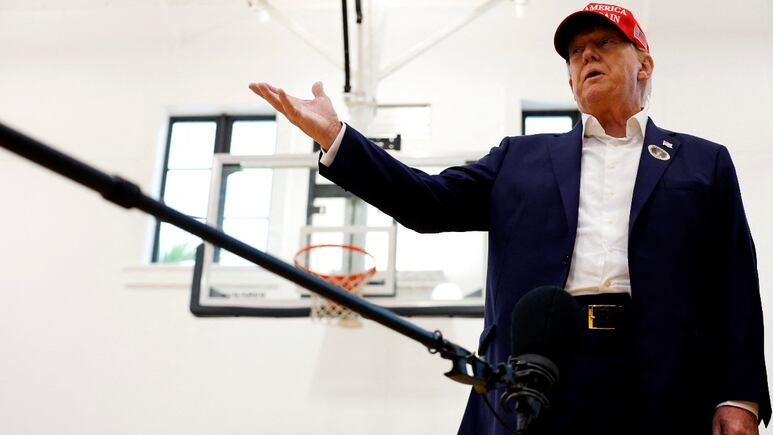Trump: the limits
Trump’s return confirms that a very significant part of the American population demands that their government be less involved in global crises, and pay more attention to the internal situation

Trump will be president for the second time. He won everything. His MAGA movement (Make America Great Again), took over the political scene. He won the Senate and is set to retain control of the House of Representatives, which will most likely achieve the dreaded “trifecta”: simultaneous control of the White House, the Senate and the aforementioned chamber.
Publicidad
He also dominates the Supreme Court of Justice, as evidenced last July, when it granted him almost absolute immunity in his acts as president. In his second term, which begins in two months, he will be able to dictate, almost at will, public policies in his country and, through federal funds, guide many programs at the state and local level.
Just as in 2016, when Trump was elected for the first time, there are many catastrophic forecasts of what his second term will represent for the world, especially for his European and Asian allies, for NATO, for Ukraine and yes, for Mexico.
Trump’s return confirms that a very significant part of the American population demands that his government be less involved in global crises, and pay more attention to the internal situation.
Publicidad
They demand geopolitical isolationism and economic protectionism. It is a position that has been present throughout the history of the United States. It dates back to George Washington who, in his farewell speech in 1796, advised his successors to avoid “permanent alliances” and conflicts with other countries, especially with Europe.
Publicidad
Throughout the 19th century, our powerful neighbor focused on westward expansion (of which Mexico was a victim), and on internal economic growth, based on protectionism. In 1919, the Senate rejected entry into the League of Nations and, during the 1930s, passed “neutrality laws” to keep the country out of conflicts in Europe and Asia.
Isolationism continued until the attacks on Pearl Harbor in 1941. At the end of World War II, the United States became a global superpower, assuming a hegemonic role, making the dollar the world currency, and shaping the backbone of global governance, with organizations such as the United Nations, the International Monetary Fund, and the World Bank.
Today, the isolationist and protectionist instinct is embodied by Trump. China, not Mexico, is the real threat to the hegemonic position that the United States has enjoyed over the past eight decades. The economic connection with our country is very deep. Thousands of American companies have investments in Mexico. We are the United States’ main trading partner, with trade exceeding $780 billion last year.
More than five million jobs in that country depend on exports to Mexico. These ties cannot be reduced by decree, via tariffs, without inflicting great costs on American companies and their consumers.
Trump will undoubtedly make efforts to redirect investments towards his territory, particularly in the automotive sector, but there are limits due to the much higher cost of labor in the United States. Imposing widespread tariffs on the entire world, and in particular on his main trading partner, would unleash inflation, as 16 Nobel Prize winners in Economics warned him last July.
If he persists, it could unleash a global tariff escalation, like that of the 1930s, which caused a major global recession.
Trump has announced massive deportations of migrants, particularly Mexicans. This must be taken seriously. There are between five and six million Mexicans in that country with irregular immigration status. But they work. Entire sectors of the US economy depend on immigrants, whether they are legally registered or not. Especially in agriculture and services. Companies in these sectors cannot do without this workforce without having a replacement.
There is no doubt that Trump will expel hundreds of thousands, perhaps millions of Mexicans during his term. But so did Obama, who expelled almost three million in eight years, and Biden, who expelled more than two million in four years. Trump is not going to leave the agricultural sector and services in the big cities without workers.
There will be raids. Deportations will impose a real burden on us, especially at the border, for which we must prepare. He will also demand more cooperation from Mexico. But the affected economic sectors in his country will impose limits on him.
Trump is a transactional negotiator. Good understandings can be reached with him. To confront his deep-rooted protectionism, Mexico must do what it has done very well in other times.
Deploy a diplomacy of excellence in the United States, reactivating its contacts with all the relevant economic and political actors not only in Washington, but throughout the territory of our neighbors. Unlike China, Mexico does not compete with the United States for global hegemony. Trump’s return should encourage us to further promote investment, job creation and economic growth in Mexico, as well as to better combat the common enemy: organized crime in both countries.
It is very good news that contacts have already begun at the highest level between President Claudia Sheinbaum and Trump himself. Surely, contacts between their teams will soon be formalized to address the complex bilateral agenda.
BY MIGUEL RUIZ CABAÑAS
CAREER DIPLOMAT AND PROFESSOR AT TEC DE MONTERREY
@miguelrcabanas
miguel.ruizcabanas@tec.mx
Content originally published in spanish in El Heraldo de México.
Publicidad
Publicidad
Más Leídas | Heraldo USA
Horas espejo: ¿Qué significa el 09:09 en el amor y qué hacer cuando lo ves?
Por Heraldo USA
¿Florinda Meza fue la responsable del final de El Chavo del 8? Esto dijo Mhoni Vidente
Por Heraldo USA
El mejor ejercicio japonés para adelgazar los brazos en UNA SEMANA
Por Heraldo USA
Joven descubre que su esposo en realidad es mujer tras casi un año de casados: FOTO
Por Heraldo USA
Publicidad
Más noticias de Donald trump
Más noticias de Estados unidos











